- Average Rating:
- Not yet rated
- Topic Areas:
- Invited Addresses | Existential Therapy | Psychotherapy
- Categories:
- Evolution of Psychotherapy | Evolution of Psychotherapy 1985
- Faculty:
- Bruno Bettelheim | Rollo May, PhD
- Course Levels:
- Master Degree or Higher in Health-Related Field
- Duration:
- 1:26:32
- Format:
- Audio and Video
- Original Program Date:
- Dec 15, 1985
- Short Description:
- Invited Address 12 - Part 2 - Existential Therapy and the Future, featuring Rollo R May, PhD. With discussant Bruno Bettelheim, PhD. Moderated by F Theodore Reid, Jr, MD.
- Price:
-
Sale is $29.00
price reduced from Base Price - $59.00
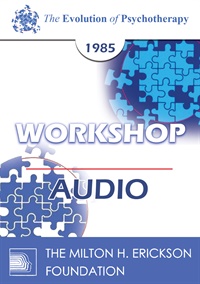
- Average Rating:
- Not yet rated
- Topic Areas:
- Workshops | Existential Therapy | Psychotherapy | Research
- Categories:
- Evolution of Psychotherapy | Evolution of Psychotherapy 1985
- Faculty:
- James Bugental, PhD
- Duration:
- 2 Hours 45 Minutes
- Format:
- Audio Only
- Original Program Date:
- Dec 12, 1985
- Short Description:
- The distinguishing elements of a psychotherapy conducted from an existential orientation and holding humanistic values. Topics briefly dealt with include centering on process rather than content; authenticity of encounter; commitment; presence; concern; the subjective; intentionality vs. causality; and developing depth of inquiry. Didactic presentations, questions and discussion, and demonstrations.
- Price:
- $15.00 - Base Price
- Average Rating:
- Not yet rated
- Topic Areas:
- Conversation Hours | Existential Therapy | Psychotherapy
- Categories:
- Evolution of Psychotherapy | Evolution of Psychotherapy 1990
- Faculty:
- Viktor Frankl, MD, PhD
- Course Levels:
- Master Degree or Higher in Health-Related Field
- Duration:
- 1:13:54
- Format:
- Audio and Video
- Original Program Date:
- Dec 13, 1990
- Short Description:
- Conversation Hour 8 from Evolution of Psychotherapy 1990, featuring Viktor Frankl, MD, PhD.
- Price:
- $59.00 - Base Price
Tags: Existential Psychotherapy
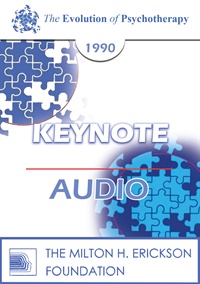
- Average Rating:
- Not yet rated
- Topic Areas:
- Keynotes | Existential Therapy | History of Psychotherapy | Psychotherapy
- Categories:
- Evolution of Psychotherapy | Evolution of Psychotherapy 1990
- Faculty:
- Viktor Frankl, MD, PhD
- Duration:
- 57 Minutes
- Format:
- Audio Only
- Original Program Date:
- Dec 13, 1990
- Short Description:
- Actually, namely historically (as well as autobiographically), "existentialism" preceded "concentration camp"- to be sure, existentialism only in the sense of something to teach and to learn, rather than - to live . .. Reminiscenses, episodes, and anecdotes will be illustrated by pertinent slides.
- Price:
- $15.00 - Base Price
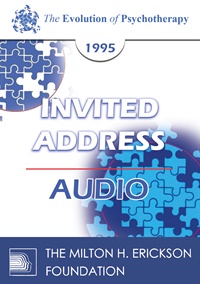
- Average Rating:
- Not yet rated
- Topic Areas:
- Invited Addresses | Existential Therapy | Therapeutic Relationship | Psychotherapy
- Categories:
- Evolution of Psychotherapy | Evolution of Psychotherapy 1995
- Faculty:
- Irvin Yalom, PhD | Miriam Polster
- Duration:
- 1:22:53
- Format:
- Audio Only
- Original Program Date:
- Dec 16, 1995
- Short Description:
- Existential psychotherapy is more properly viewed as a therapy informed by a sensibiity to existential issues, rather than as a discrete, self-contained school of therapy. It addresses the anxiety embedded in our consciousness of the parameters of existence, especially in our confrontation with death, meaninglessness, freedom, and isolation. I shall discuss these concerns, particularly those with the greatest relevance to everyday therapy practice. I shall discuss the implications of the existential sensibility for the conduct of therapy and the therapeutic relationship. Genuineness and authenticity are necessary.
- Price:
- $15.00 - Base Price
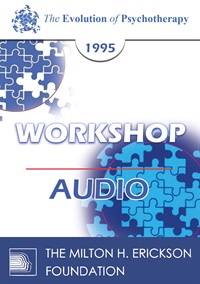
- Average Rating:
- Not yet rated
- Topic Areas:
- Workshops | Psychotherapy | Existential Therapy | Religion
- Categories:
- Evolution of Psychotherapy | Evolution of Psychotherapy 1995
- Faculty:
- Thomas Szasz, MD
- Duration:
- 2:39:51
- Format:
- Audio Only
- Original Program Date:
- Dec 14, 1995
- Short Description:
- Szasz considers the role of responsibility in religion, civil and criminal law, medicine and the mental health professions; the differences among existential responsibility, moral blameworthiness and legal accountability; that connections between (mental) competence and responsibility; and relates all of the above to problems in psychotherapeutic theory and practice.
- Price:
- $15.00 - Base Price
Tags: Existential Psychotherapy Religion
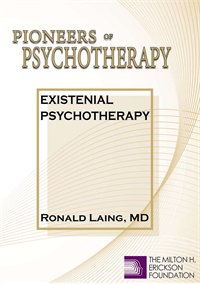
- Average Rating:
- Not yet rated
- Topic Areas:
- Clinical Demonstrations | Psychotherapy | Existential Therapy | Religion | Schizophrenia
- Bundle(s):
- Pioneers of Psychotherapy Bundle
- Categories:
- Pioneers of Psychotherapy | Evolution of Psychotherapy | Evolution of Psychotherapy 1985
- Faculty:
- Ronald Laing, MD
- Course Levels:
- Master Degree or Higher in Health-Related Field
- Duration:
- 01:11:00
- Format:
- Audio and Video
- Original Program Date:
- Dec 12, 1985
- Short Description:
- Ronald Laing (1985) interviews a home-less woman diagnosed with paranoid schizophrenia. Her presenting complaint is that her brain does not work right and that people are out to get her. Laing relates to the client and explores her theories of human conspiracy, the power of the mind and mind reading, issues of Christianity, and how these concepts relate to her.
- Price:
- $59.00 - Base Price
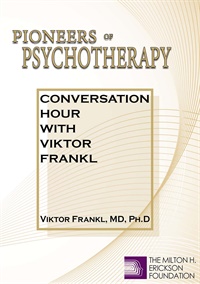
- Average Rating:
- Not yet rated
- Topic Areas:
- Conversation Hours | Existential Therapy | Psychotherapy
- Bundle(s):
- Pioneers of Psychotherapy Bundle
- Categories:
- Evolution of Psychotherapy | Evolution of Psychotherapy 1990 | Pioneers of Psychotherapy
- Faculty:
- Viktor Frankl, MD, PhD
- Course Levels:
- Master Degree or Higher in Health-Related Field
- Duration:
- 1 Hour 12 Minutes
- Format:
- Audio and Video
- Original Program Date:
- Dec 12, 1990
- Short Description:
- Viktor Frankl (1990) shares his experiences living in a WW-II concentration camp. He teaches the importance of creating meaning in one’s life and the application of ethics in daily choices. He emphasizes the importance of reconciliation in contrast to collective guilt and the importance of finding meaningful responses to all forms of tragedy.
- Price:
-
Evo Stream Subscription is $0.00
price reduced from Base Price - $59.00
Please wait ...



